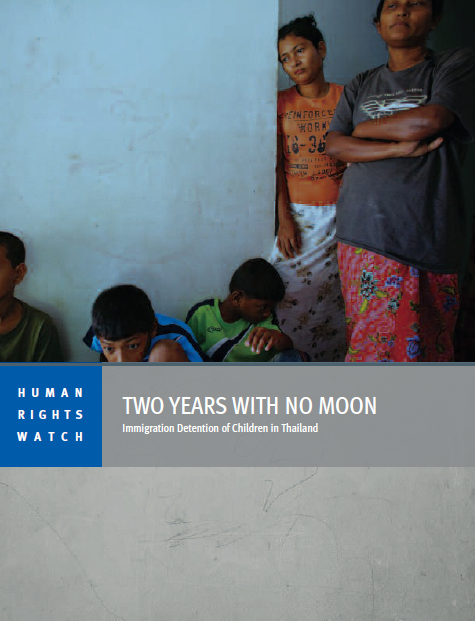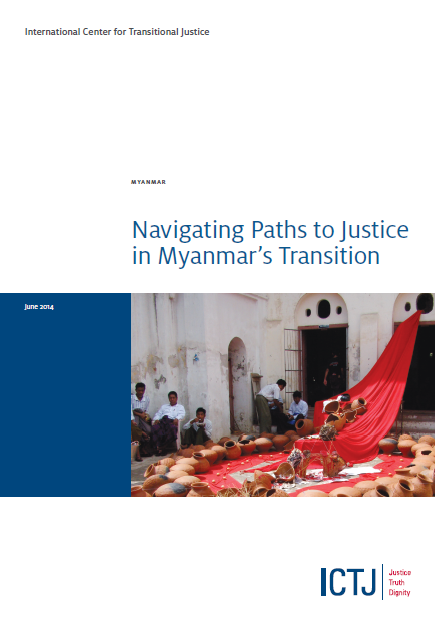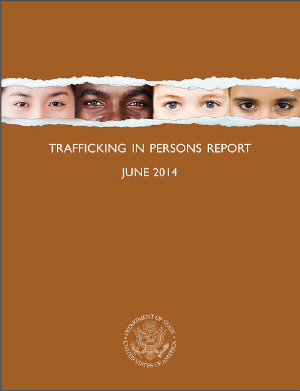Posts Tagged ‘Human Trafficking’ (68 found)
Parliamentarians Call on ASEAN Leaders to Address the Rohingya Crisis and the Escalating Risk of Atrocity Crimes in Myanmar
KUALA LUMPUR — ASEAN leaders must urgently respond to the escalating crisis situation for Rohingya Muslims and other vulnerable minorities in Myanmar, ASEAN Parliamentarians for Human Rights (APHR) said today in a public call on regional governments on the eve of the 26th ASEAN Summit […]
• • •“အစိုးရသစ္ႏွင့္ ျမန္မာႏိုင္ငံ လူ႔အခြင့္အေရး အေျခအေန” အစီရင္ခံစာ
 ၂၀၁၀ ႏို၀င္ဘာလ (၇) ရက္ေန႔ အျငင္းပြားဖြယ္ ေရြးေကာက္ပြဲၾကီး အၿပီး ေပၚထြက္ လာသည့္ ေရြးခ်ယ္ခံ အစိုးရသစ္ လက္ထက္ တြင္ ႏိုင္ငံေရး၊ စီးပြားေရးဆိုင္ရာ အေျပာင္းအလဲ အခ်ိဳ႕ရွိခဲ့ေသာ္လည္း ယခင္ လူ႔အခြင့္ အေရး ခ်ိဳးေဖာက္သူမ်ားအား လံုး၀ကင္းလြတ္ ခြင့္ျပဳထားပါသည္။ ထို႔ျပင္ ယခင္လူ႔အခြင့္အေရး ခ်ိဳးေဖာက္ ခံရသူမ်ားအား ျပန္လည္ ကုစားေပးမႈ လံုး၀မရွိေပ။
၂၀၁၀ ႏို၀င္ဘာလ (၇) ရက္ေန႔ အျငင္းပြားဖြယ္ ေရြးေကာက္ပြဲၾကီး အၿပီး ေပၚထြက္ လာသည့္ ေရြးခ်ယ္ခံ အစိုးရသစ္ လက္ထက္ တြင္ ႏိုင္ငံေရး၊ စီးပြားေရးဆိုင္ရာ အေျပာင္းအလဲ အခ်ိဳ႕ရွိခဲ့ေသာ္လည္း ယခင္ လူ႔အခြင့္ အေရး ခ်ိဳးေဖာက္သူမ်ားအား လံုး၀ကင္းလြတ္ ခြင့္ျပဳထားပါသည္။ ထို႔ျပင္ ယခင္လူ႔အခြင့္အေရး ခ်ိဳးေဖာက္ ခံရသူမ်ားအား ျပန္လည္ ကုစားေပးမႈ လံုး၀မရွိေပ။
အစ္ိုးရသစ္ လက္ထက္တြင္ ႏိုင္ငံအတြင္း လႊတ္ေတာ္မ်ား၊ အုပ္ခ်ဳပ္မႈ ပံုစံမ်ား အသစ္မ်ားႏွင့္ ျမန္မာႏိုင္ငံအမ်ိဳးသား လူ႔အခြင့္ အေရးေကာ္ မရွင္တို႔ ေပၚေပါက္ လာခဲ့ေသာ္လည္း လူထု၏ အေျခခံ အခြင့္အေရးမ်ားကို ထိေရာက္သည့္ ကာကြယ္မႈေပးရန္ ပ်က္ကြက္ဆဲျဖစ္သည္။ လႊတ္ေတာ္ မ်ားမွ ဥပေဒမ်ားေရးဆြဲျပဌာန္း မႈတြင္လည္း လူထု၏ အခြင့္အေရးမ်ားကို အေလးထား ထည့္သြင္းေရးဆြဲျခင္း မျပဳေပ။ ယခင္အစိုးရ အဆက္ဆက္ လူထုအားခ်ဳပ္ကိုင္သည့္ ဥပေဒမ်ားအား ဖ်က္သိမ္းျခင္း၊ ျပင္ဆင္ျခင္း၊ အသစ္ေရးဆြဲျခင္းမ်ား မရွိသေလာက္ နည္းပါးလွ်က္ ရွိပါသည္။ ျမန္မာႏိုင္ငံ အမ်ိဳးသား လူ႔အခြင့္အေရးေကာ္မရွင္ တစ္ရပ္ေပၚေပါက္ လာ ေသာ္လည္း လူ႔အခြင့္အေရး ခ်ိဳးေဖာက္မႈမ်ားအေပၚ ထိေရာက္သည့္ ကာကြယ္မႈမ်ား မေပးႏိုင္ျခင္း၊ ၄င္းေကာ္မရွင္၏ လုပ္ပိုင္ ခြင့္မ်ားအား ထိန္းခ်ဳပ္ ကန္႔သတ္္မႈ မ်ား ခံေနရၿပီး လူ႔အခြင့္ အေရးျမွင့္တင္ရန္ ကိစၥရပ္မ်ားကိုလည္း ေဆာင္ ရြက္ႏိုင္ျခင္း မရွိေပ။ […]
• • •Key Messages to World Leaders, International Governments and the UN Concerns and Requests Related to Humanitarian Situation in Kachin and Northern Shan States, Myanmar
The 25th ASEAN Summit is commencing from 11 to 13 November 2014, hosted by Myanmar in its capital, NaypyiTaw. Most prominent world leaders are gathering and discussing important matters affecting the ASEAN countries and, inevitably, the interconnected global arena. On this occasion, Joint Strategy Team for Kachin Humanitarian Response would like to urge the world leaders, international governments and the UN to pay attention to the following concerns and take immediate actions to fulfill the requests. We firmly believe that the world leaders, international governments and the UN will strongly support the protection of dignity and rights of the internally displaced persons. […]
• • •Equal Only in Name: the Human Rights of Stateless Rohingya in Thailand
Two important new reports on discrimination against stateless Rohingya in Malaysia and Thailand were launched today by the Equal Rights Trust in partnership with the Institute for Human Rights and Peace Studies Mahidol University, Bangkok (IHRP) […]
• • •Equal Rights Trust Publishes Two Reports on Stateless Rohingya Refugees in Malaysia and Thailand
Two important new reports on discrimination against stateless Rohingya in Malaysia and Thailand were launched today by the Equal Rights Trust in partnership with the Institute for Human Rights and Peace Studies Mahidol University, Bangkok (IHRP) […]
• • •Two Years With No Moon: Immigration Detention of Children in Thailand
Every year, Thailand arbitrarily detains thousands of children, from infants and toddlers and older, in squalid immigration facilities and police lock-ups. Around 100 children—primarily from countries that do not border Thailand—may be held for months or years. Thousands more children—from Thailand’s neighboring countries—spend less time in this abusive system because Thailand summarily deports them and their families to their home countries relatively quickly. For them, detention tends to last only days or weeks.
But no matter how long the period of detention, these facilities are no place for children.
Drawing on more than 100 interviews, including with 41 migrant children, documenting conditions for refugees and other migrants in Thailand, this report focuses on how the Thai government fails to uphold migrants’ rights, describing the needless suffering and permanent harm that children experience in immigration detention. It examines the abusive conditions children endure in detention centers, particularly in the Bangkok Immigration Detention Center (IDC), one of the most heavily used facilities in Thailand […]
• • •Thailand: Migrant Children Locked Up
Thailand holds thousands of migrant children in detention each year, causing them physical and emotional harm, Human Rights Watch said in a report released today. Child migrants and asylum seekers are unnecessarily held in squalid immigration facilities and police lock-ups due to their immigration status or that of their parents […]
• • •New report by Network for Human Rights Documentation-Burma (ND-Burma) Documenting On-going Human Rights Abuses in Burma
ND-Burma has published its periodic report covering the first half of 2014, focusing on 103 documented cases of human rights violations in Burma from January to June, 2014. There are many serious human rights issues highlighted in this report: torture, extra-judicial killing, illegal arrests and detentions, arbitrary taxation, property crime, forced labor, human trafficking, forced displacement and rape […]
• • •Navigating Paths to Justice in Myanmar’s Transition
Since President Thein Sein and his government took office in 2011, Myanmar’s transition has unfolded at a pace that has surprised many and earned the acclaim of western governments, financial institutions, and private-sector investment analysts.1 The Burmese population of approximately 60 million has endured more than a half-century of military dictatorship, armed conflict, economic dysfunction, and political repression.2 A meaningful transformation into a peaceful society that enjoys economic development and functions democratically now seems plausible, though it is far from guaranteed. Ultimately, the blanket immunity afforded by the 2008 Constitution shields the acts attributable to prior regimes from any form of accountability.3 Whether the reform process will evolve to include measures that address the massive and systematic injustices of the past remains less certain.
• • •Trafficking in Persons Report 2014
Burma is a source country for men, women, and children subjected to forced labor, and for women and children subjected to sex trafficking in other countries. Burmese men, women, and children who migrate for work abroad, particularly to Thailand and China, are subjected to conditions of forced labor or sex trafficking in these countries. Poor economic conditions within Burma continue to drive large numbers of Burmese men, women, and children to migrate through both legal and illegal channels for work primarily in East Asia, as well as destinations including the Middle East, South Asia, and the United States. Men are most often subjected to forced labor, often in the fishing, manufacturing, and construction industries abroad. Women and girls are primarily subjected to sex trafficking or domestic servitude. The large numbers of migrants seeking work in Thailand’s fishing and domestic work sectors do so outside formal channels. Some Burmese men in the Thai fishing industry are subjected to debt bondage, passport confiscation, or false employment offers; some are also subjected to physical abuse and are forced to remain aboard vessels in international waters for years […]
• • •











 All posts
All posts